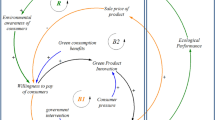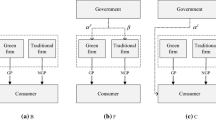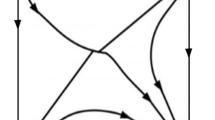Abstract
In the context of green development and the construction of ecological civilization, a key issue for governments is how to promote firms’ green technology innovation. Assuming the bounded rationality of decision-makers, this paper constructs a game model of green technology innovation between firms and the government based on prospect theory. It dynamically analyzes the decision process and optimal strategy under different scenarios and uses numerical simulation to identify the influencing factors. There are three main findings. (1) Firms’ green technology innovation decisions depend on the net income difference between strategies. Environmental regulation encourages firms to carry out green technology innovation by increasing the environmental costs to non-green technology innovation firms and increasing the income of green technology innovation firms. (2) Uncertainty and the behavioral characteristics of managers significantly affect green technology innovation. Firms’ green technology innovation is positively correlated with the success rate of green technology innovation, whereas is negatively correlated with perceived value sensitivity and loss aversion. (3) There is instrumental heterogeneity in the incentive effect of environmental regulation on firms’ green technology innovation. The most effective tool is comprehensive environmental regulation, followed by punishment and then subsidy. The research provides a reference for governments to formulate environmental regulations and firms to manage innovation.











Similar content being viewed by others
Data availability
The datasets used and/or analyzed during the current study are available from the corresponding author on reasonable request.
References
Ahmad, M., & Wu, Y. (2022). Combined role of green productivity growth, economic globalization, and eco-innovation in achieving ecological sustainability for OECD economies. Journal of Environmental Management, 302, 113980. https://doi.org/10.1016/j.jenvman.2021.113980
Ai, Y.-H., Peng, D.-Y., & Xiong, H.-H. (2021). Impact of environmental regulation intensity on green technology innovation: From the perspective of political and business connections. Sustainability, 13, 4862. https://doi.org/10.3390/su13094862
Bai, Y., Song, S., Jiao, J., & Yang, R. (2019). The impacts of government R&D subsidies on green innovation: Evidence from Chinese energy-intensive firms. Journal of Cleaner Production, 233, 819–829. https://doi.org/10.1016/j.jclepro.2019.06.107
Bigerna, S., Wen, X., Hagspiel, V., & Kort, P. M. (2019). Green electricity investments: Environmental target and the optimal subsidy. European Journal of Operational Research, 279(2), 635–644. https://doi.org/10.1016/j.ejor.2019.05.041
Borsatto, J. M. L. S., & Bazani, C. L. (2021). Green innovation and environmental regulations: A systematic review of international academic works. Environmental Science and Pollution Research, 28, 63751–63768. https://doi.org/10.1007/s11356-020-11379-7
Cai, X., Zhu, B., Zhang, H., Li, L., & Xie, M. (2020). Can direct environmental regulation promote green technology innovation in heavily polluting industries? Evidence from Chinese listed companies. Science of the Total Environment, 746, 140810. https://doi.org/10.1016/j.scitotenv.2020.140810
Campo, R., & Trio, O. (2021). Think green: The eco-innovative approach of a sustainable small enterprise. Journal of the Knowledge Economy. https://doi.org/10.1007/s13132-021-00833-7
Chen, H., Wang, J., & Miao, Y. (2021a). Evolutionary game analysis on the selection of green and low carbon innovation between manufacturing enterprises. Alexandria Engineering Journal, 60(2), 2139–2147. https://doi.org/10.1016/j.aej.2020.12.015
Chen, X., Long, R., & Chen, H. (2020). A policy utility dislocation model based on prospect theory: A case study of promoting policies with low-carbon lifestyle. Energy Policy, 137, 111134. https://doi.org/10.1016/j.enpol.2019.111134
Chen, Z., Zhang, X., & Chen, F. (2021b). Do carbon emission trading schemes stimulate green innovation in enterprises? Evidence from China. Technological Forecasting and Social Change, 168, 120744. https://doi.org/10.1016/j.techfore.2021.120744
Chien, F., Sadiq, M., Nawaz, M. A., Hussain, M. S., Tran, T. D., & Thanh, T. L. (2021). A step toward reducing air pollution in top Asian economies: The role of green energy, eco-innovation, and environmental taxes. Journal of Environmental Management, 297(1), 113420. https://doi.org/10.1016/j.jenvman.2021.113420
D’Agostino, M. L. (2015). How MNEs respond to environmental regulation: Integrating the Porter hypothesis and the pollution haven hypothesis. Economia Politica, 32, 245–269. https://doi.org/10.1007/s40888-015-0010-2
Du, K., Cheng, Y., & Yao, X. (2021). Environmental regulation, green technology innovation, and industrial structure upgrading: The road to the green transformation of Chinese cities. Energy Economics, 98, 105247. https://doi.org/10.1016/j.eneco.2021.105247
Du, L., Lin, W., Du, J., Jin, M., & Fan, M. (2022). Can vertical environmental regulation induce enterprise green innovation? A new perspective from automatic air quality monitoring station in China. Journal of Environmental Management, 317, 115349. https://doi.org/10.1016/j.jenvman.2022.115349
Eghbali, M., Rasti-Barzoki, M., & Safarzadeh, S. (2022). A hybrid evolutionary game-theoretic and system dynamics approach for analysis of implementation strategies of green technological innovation under government intervention. Technology in Society, 70, 102039. https://doi.org/10.1016/j.techsoc.2022.102039
Farrukh, M., Ansari, N., Raza, A., Wu, Y., & Wang, H. (2022). Fostering employee’s pro-environmental behavior through green transformational leadership, green human resource management and environmental knowledge. Technological Forecasting and Social Change, 179, 121643. https://doi.org/10.1016/j.techfore.2022.121643
Gao, S., & Wang, C. (2021). How to design emission trading scheme to promote corporate low-carbon technological innovation: Evidence from China. Journal of Cleaner Production, 298, 126712. https://doi.org/10.1016/j.jclepro.2021.126712
Hameed, I., Hyder, Z., Imran, M., & Shafiq, K. (2021). Greenwash and green purchase behavior: An environmentally sustainable perspective. Environment. Development and Sustainability, 23, 13113–13134. https://doi.org/10.1007/s10668-020-01202-1
Huang, M., Li, M., & Liao, Z. (2021). Do politically connected CEOs promote Chinese listed industrial firms’ green innovation? The mediating role of external governance environments. Journal of Cleaner Production, 278, 123634. https://doi.org/10.1016/j.jclepro.2020.123634
Iqbal, S., Akhtar, S., Anwar, F., Kayani, A. J., Sohu, J. M., & Khan, A. S. (2021). Linking green innovation performance and green innovative human resource practices in SMEs; a moderation and mediation analysis using PLS-SEM. Current Psychology. https://doi.org/10.1007/s12144-021-02403-1
Jin, J., Zhuang, J., & Zhao, Q. (2018). Supervision after certification: An evolutionary game analysis for Chinese environmental labeled firms. Sustainability, 10, 1494. https://doi.org/10.3390/su10051494
Jin, P., Peng, C., & Song, M. (2019). Macroeconomic uncertainty, high-level innovation, and urban green development performance in China. China Economic Review, 55, 1–18. https://doi.org/10.1016/j.chieco.2019.02.008
Jung, S., & Feng, T. (2020). Government subsidies for green technology development under uncertainty. European Journal of Operational Research, 2, 726–739. https://doi.org/10.1016/j.ejor.2020.03.047
Kahneman, D., & Tversky, A. (1979). Prospect theory: An analysis of decision under risk. Econometrica, 47(2), 263–292. https://doi.org/10.2307/1914185
Karakosta, O., & Petropoulou, D. (2022). The EU electricity market: Renewables targets, tradable green certificates and electricity trade. Energy Economics, 111, 106034. https://doi.org/10.1016/j.eneco.2022.106034
Kui, W., & Jiang, W. (2021). State ownership and green innovation in China: The contingent roles of environmental and organizational factors. Journal of Cleaner Production, 314, 128029. https://doi.org/10.1016/j.jclepro.2021.128029
Lähteenmäki-Uutela, A., Yliskylä-Peuralahti, J., Olaniyi, E., Haukioja, T., Repka, S., Prause, G., & Gonzalez, O. D. A. (2019). The impacts of the sulphur emission regulation on the sulphur emission abatement innovation system in the Baltic Sea region. Clean Technologies and Environmental Policy, 21, 987–1000. https://doi.org/10.1007/s10098-019-01684-2
Lai, H., Wang, F., & Guo, C. (2022). Can environmental awards stimulate corporate green technology innovation? Evidence from Chinese listed companies. Environmental Science and Pollution Research, 29, 14856–14870. https://doi.org/10.1007/s11356-021-16632-1
Lee, C., Hussain, J., & Chen, Y. (2022). The optimal behavior of renewable energy resources and government’s energy consumption subsidy design from the perspective of green technology implementation. Renewable Energy, 195, 670–680. https://doi.org/10.1016/j.renene.2022.06.070
Li, J. (2022). Can technology-driven cross-border mergers and acquisitions promote green innovation in emerging market firms? Evidence from China. Environmental Science and Pollution Research, 29, 27954–27976. https://doi.org/10.1007/s11356-021-18154-2
Lin, L., & Hong, Y. (2022). Developing a green bonds market: Lessons from China. European Business Organization Law Review, 23, 143–185. https://doi.org/10.1007/s40804-021-00231-1
Lin, W. L., Cheah, J. H., Azali, M., Ho, J., & Yip, N. (2019). Does firm size matter? Evidence on the impact of the green innovation strategy on corporate financial performance in the automotive sector. Journal of Cleaner Production, 229, 974–988. https://doi.org/10.1016/j.jclepro.2019.04.214
Liu, L., Wang, Z., Xu, J., & Zhang, Z. (2022a). Green baton: How government interventions advance green technological innovation. Environment, Development and Sustainability. https://doi.org/10.1007/s10668-022-02520-2
Liu, M., & Li, Y. (2022). Environmental regulation and green innovation: Evidence from China’s carbon emissions trading policy. Finance Research Letters, 48, 103051. https://doi.org/10.1016/j.frl.2022.103051
Liu, Y., Liu, W., Yan, Y., & Liu, C. (2022b). A perspective of ecological civilization: Research on the spatial coupling and coordination of the energy-economy-environment system in the Yangtze River Economic Belt. Environmental Monitoring and Assessment, 194, 403. https://doi.org/10.1007/s10661-022-10065-0
Ma, D., & Zhu, Q. (2022). Innovation in emerging economies: Research on the digital economy driving high-quality green development. Journal of Business Research, 145, 801–813. https://doi.org/10.1016/j.jbusres.2022.03.041
Ma, Y., Zhang, Q., & Yin, Q. (2021). Top management team faultlines, green technology innovation and firm financial performance. Journal of Environmental Management, 285, 112095. https://doi.org/10.1016/j.jenvman.2021.112095
Maryam, H., & Hossein, Z. (2018). Green product development and environmental performance: Investigating the role of government regulations. International Journal of Production Economics, 204, 395–410. https://doi.org/10.1016/j.ijpe.2018.08.012
Meng, Q., Liu, Y., Li, Z., & Wu, C. (2021). Dynamic reward and penalty strategies of green building construction incentive: An evolutionary game theory-based analysis. Environmental Science and Pollution Research, 28, 44902–44915. https://doi.org/10.1007/s11356-021-13624-z
Peng, H., Shen, N., Ying, H., & Wang, Q. (2021a). Can environmental regulation directly promote green innovation behavior?— Based on situation of industrial agglomeration. Journal of Cleaner Production, 314, 128044. https://doi.org/10.1016/j.jclepro.2021.128044
Peng, W., Yin, Y., Kuang, C., Wen, Z., & Kuang, J. (2021b). Spatial spillover effect of green innovation on economic development quality in China: Evidence from a panel data of 270 prefecture-level and above cities. Sustainable Cities and Society, 69, 102863. https://doi.org/10.1016/j.scs.2021.102863
Quan, X., Ke, Y., Qian, Y., & Zhang, Y. (2021). CEO foreign experience and green innovation: Evidence from China. Journal of Business Ethics. https://doi.org/10.1007/s10551-021-04977-z
Roper, S., & Tapinos, E. (2016). Taking risks in the face of uncertainty: An exploratory analysis of green innovation. Technological Forecasting and Social Change, 112, 357–363. https://doi.org/10.1016/j.techfore.2016.07.037
Scarpellini, S., Valero-Gil, J., & Portillo-Tarragona, P. (2016). The “economic–finance interface” for eco-innovation projects. International Journal of Project Management, 34(6), 1012–1025. https://doi.org/10.1016/j.ijproman.2016.04.005
Shen, H., Peng, Y., & Guo, C. (2018). Analysis of the evolution game of construction and demolition waste recycling behavior based on prospect theory under environmental regulation. International Journal of Environmental Research, 15, 1518. https://doi.org/10.3390/ijerph15071518
Shu, C., Zhao, M., Liu, J., & Lindsay, W. (2020). Why firms go green and how green impacts financial and innovation performance differently: An awareness-motivation-capability perspective. Asia Pacific Journal of Management, 37, 795–821. https://doi.org/10.1007/s10490-018-9630-8
Stucki, T., Woerter, M., Arvanitis, S., Peneder, M., & Rammer, C. (2018). How different policy instruments affect green product innovation: A differentiated perspective. Energy Policy, 114, 245–261. https://doi.org/10.1016/j.enpol.2017.11.049
Su, Y., Zhao, M., Wei, G., Wei, C., & Chen, X. (2022). Probabilistic uncertain linguistic EDAS method based on prospect theory for multiple attribute group decision-making and its application to green finance. International Journal of Fuzzy Systems, 24, 1318–1331. https://doi.org/10.1007/s40815-021-01184-w
Sun, Y., Du, J., & Wang, S. (2020). Environmental regulations, enterprise productivity, and green technological progress: Large-scale data analysis in China. Annals of Operations Research, 290, 369–384. https://doi.org/10.1007/s10479-019-03249-4
Tan, Y., & Zhu, Z. (2022). The effect of ESG rating events on corporate green innovation in China: The mediating role of financial constraints and managers’ environmental awareness. Technology in Society, 68, 101906. https://doi.org/10.1016/j.techsoc.2022.101906
Tsai, M. T., Chuang, L. M., Chao, S. T., & Chang, H. P. (2012). The effects assessment of firm environmental strategy and customer environmental conscious on green product development. Environmental Monitoring and Assessment, 184, 4435–4447. https://doi.org/10.1007/s10661-011-2275-4
Tversky, A., & Kahneman, D. (1992). Advances in prospect theory: Cumulative representation of uncertainty. Journal of Risk and Uncertainty, 5(4), 297–323. https://doi.org/10.1007/BF00122574
Usman, M., Javed, M., & Yin, J. (2020). Board internationalization and green innovation. Economics Letters, 197, 109625. https://doi.org/10.1016/j.econlet.2020.109625
Wang, L. P., & Li, C. (2022). Experimental research on green technology innovation behavior based on voluntary contribution mechanism. Journal of Environmental Protection and Ecology, 23(3), 1345–1353.
Wang, L. P., Li, C., & Li, S. Q. (2020). Can environmental information disclosure regulate the relationship between environmental cost and enterprise value. International Journal of Environment and Pollution, 67(2–4), 95–110. https://doi.org/10.1504/IJEP.2020.117787
Wang, G., Chao, Y., Cao, Y., Jiang, T., Han, W., & Chen, Z. (2022). A comprehensive review of research works based on evolutionary game theory for sustainable energy development. Energy Reports, 8, 114–136. https://doi.org/10.1016/j.egyr.2021.11.231
Wang, Y., Wang, X., Chang, S., & Kang, Y. (2019). Product innovation and process innovation in a dynamic Stackelberg game. Computers & Industrial Engineering, 130, 395–403. https://doi.org/10.1016/j.cie.2019.02.042
Wu, J., Chen, Z., & Guo, C. (2022a). How does anti-corruption affect green innovation? Evidence from China. Economic Analysis and Policy, 73, 405–424. https://doi.org/10.1016/j.eap.2021.12.004
Wu, Z., Fan, X., Zhu, B., Xia, J., Zhang, L., & Wang, P. (2022b). Do government subsidies improve innovation investment for new energy firms: A quasi-natural experiment of China’s listed companies. Technological Forecasting and Social Change, 175, 121418. https://doi.org/10.1016/j.techfore.2021.121418
Xie, X., Huo, J., & Zou, H. (2019). Green process innovation, green product innovation, and corporate financial performance: A content analysis method. Journal of Business Research, 101, 697–706. https://doi.org/10.1016/j.jbusres.2019.01.010
Xue, L., & Zhang, X. (2022). Can digital financial inclusion promote green innovation in heavily polluting companies? International Journal of Environmental Research, 19, 7323. https://doi.org/10.3390/ijerph19127323
Yan, X., Zhang, Y., & Pei, L. (2021). The impact of risk-taking level on green technology innovation: Evidence from energy-intensive listed companies in China. Journal of Cleaner Production, 281, 124685. https://doi.org/10.1016/j.jclepro.2020.124685
Yang, D., Wang, A. X., Zhou, K. Z., & Jiang, W. (2019). Environmental strategy, institutional force, and innovation capability: A managerial cognition perspective. Journal of Business Ethics, 159, 1147–1161. https://doi.org/10.1007/s10551-018-3830-5
Yang, G., & Liu, B. (2021). Research on the impact of managers’ green environmental awareness and strategic intelligence on corporate green product innovation strategic performance. Economic Change and Restructuring. https://doi.org/10.1007/s10479-021-04243-5
Yang, Z., & Lin, Y. (2020). The effects of supply chain collaboration on green innovation performance: An interpretive structural modeling analysis. Sustainable Production and Consumption, 23, 1–10. https://doi.org/10.1016/j.spc.2020.03.010
Yi, M., Fang, X., Wen, L., Guang, F., & Zhang, Y. (2019). The heterogeneous effects of different environmental policy instruments on green technology innovation. International Journal of Environmental Research, 16, 4660. https://doi.org/10.3390/ijerph16234660
Yousaf, U. B., Ullah, I., Jiang, J., & Wang, M. (2022a). The role of board capital in driving green innovation: Evidence from China. Journal of Behavioral and Experimental Finance., 100714,. https://doi.org/10.1016/j.jbef.2022.100714
Yousaf, Z., Radulescu, M., Sinisi, C., Nassani, A. A., & Haffar, M. (2022b). How do firms achieve green innovation? Investigating the influential factors among the energy sector. Energies, 15, 2549. https://doi.org/10.3390/en15072549
Yu, C. H., Wu, X., Zhang, D., She, C., & Zhao, J. (2021). Demand for green finance: Resolving financing constraints on green innovation in China. Energy Policy, 153(1), 112255. https://doi.org/10.1016/j.enpol.2021.112255
Yuan, B., & Xiang, Q. (2018). Environmental regulation, industrial innovation and green development of Chinese manufacturing: Based on an extended CDM model. Journal of Cleaner Production, 176, 895–908. https://doi.org/10.1016/j.jclepro.2017.12.034
Yuan, R., & Wen, W. (2018). Managerial foreign experience and corporate innovation. Journal of Corporate Finance, 48, 752–770. https://doi.org/10.1016/j.jcorpfin.2017.12.015
Zameer, H., Wang, Y., Vasbieva, D. G., & Abbas, Q. (2021). Exploring a pathway to carbon neutrality via reinforcing environmental performance through green process innovation, environmental orientation and green competitive advantage. Journal of Environmental Management, 296, 113383. https://doi.org/10.1016/j.jenvman.2021.113383
Zhang, D., Rong, Z., & Ji, Q. (2019). Green innovation and firm performance: Evidence from listed companies in China. Resources Conservation and Recycling, 144, 48–55. https://doi.org/10.1016/j.resconrec.2019.01.023
Zhang, H., Shao, Y., Han, X., & Chang, H. (2022a). A road towards ecological development in China: The nexus between green investment, natural resources, green technology innovation, and economic growth. Resources Policy, 77, 102746. https://doi.org/10.1016/j.resourpol.2022.102746
Zhang, S., Yu, Y., Zhu, Q., Qiu, C., & Tian, A. (2020). Green innovation mode under carbon tax and innovation subsidy: An evolutionary game analysis for portfolio policies. Sustainability, 12, 1385. https://doi.org/10.3390/su12041385
Zhang, Y., & Li, X. (2022). The impact of the green finance reform and innovation pilot zone on the green innovation—Evidence from China. International Journal of Environmental Research, 19, 7330. https://doi.org/10.3390/ijerph19127330
Zhang, Y., Liu, H., & Li, M. (2022b). Does chief executive officer turnover affect green innovation quality and quantity? Evidence from China’s Manufacturing Enterprises. Environmental Science and Pollution Research. https://doi.org/10.1007/s11356-022-20365-0
Zhang, Z., & Chen, H. (2022). Dynamic interaction of renewable energy technological innovation, environmental regulation intensity and carbon pressure: Evidence from China. Renewable Energy, 192, 420–430. https://doi.org/10.1016/j.renene.2022.04.136
Zhao, J., Pongtornkulpanich, A., & Cheng, W. (2022a). The impact of board size on green innovation in China’s heavily polluting enterprises: The mediating role of innovation openness. Sustainability, 14, 8632. https://doi.org/10.3390/su14148632
Zhao, Y., Mao, J., & Li, Y. (2022b). Local governments’ environmental emphasis and corporate green innovation: Evidence from China. Economic Change and Restructuring. https://doi.org/10.1007/s10644-022-09406-3
Zhong, Z., & Peng, B. (2022). Can environmental regulation promote green innovation in heavily polluting enterprises? Empirical evidence from a quasi-natural experiment in China. Sustainable Production and Consumption, 30, 815–828. https://doi.org/10.1016/j.spc.2022.01.017
Zhou, M., Govindan, K., Xie, X., & Yan, L. (2021). How to drive green innovation in China’s mining enterprises? Under the perspective of environmental legitimacy and green absorptive capacity. Resources Policy, 72, 102038. https://doi.org/10.1016/j.resourpol.2021.102038
Zhu, Y., Wang, Z., Qiu, S., & Zhu, L. (2019). Effects of environmental regulations on technological innovation efficiency in China’s industrial enterprises: A spatial analysis. Sustainability, 11, 2186. https://doi.org/10.3390/su11072186
Funding
The research is supported by the National Social Science Fund of China (22AJY013).
Author information
Authors and Affiliations
Contributions
Chuang Li and Zhijia Wang prepared the manuscript. Chuang Li and Liping Wang performed analysis.
Corresponding author
Ethics declarations
Ethical approval
This study conforms to the ethical and moral requirements.
Consent to participate
All the authors of this article were consented to participate.
Consent for publication
This study was consented to be published.
Conflict of interest
The authors declare no competing interests.
Additional information
Publisher's Note
Springer Nature remains neutral with regard to jurisdictional claims in published maps and institutional affiliations.
Rights and permissions
Springer Nature or its licensor (e.g. a society or other partner) holds exclusive rights to this article under a publishing agreement with the author(s) or other rightsholder(s); author self-archiving of the accepted manuscript version of this article is solely governed by the terms of such publishing agreement and applicable law.
About this article
Cite this article
Li, C., Wang, Z. & Wang, L. Factors affecting firms’ green technology innovation: an evolutionary game based on prospect theory. Environ Monit Assess 195, 227 (2023). https://doi.org/10.1007/s10661-022-10835-w
Received:
Accepted:
Published:
DOI: https://doi.org/10.1007/s10661-022-10835-w




